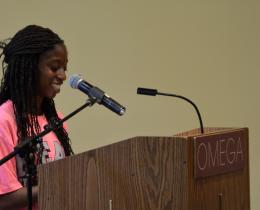Omega: What unique challenges and opportunities do women have while speaking in public?
Barbara: First of all to set the tone, I think that gender is interpreted much more broadly now than just women and men. Certainly how we define ourselves and our gender is not so categorical as it was in the past.
That said, the first challenge for women in public speaking is how to deal with a world that is yet to be equal. There is also the challenge of how to be heard in a world where certain voices are privileged. Not just voices, but certain styles of speaking are privileged above others. If we look at the kind of speech that is privileged in the United States, it's generally white, male or male-identified, and a heterosexual or cisgender voice. It's not necessarily the language that other people have been taught or are even allowed to use.
One of the additional challenges is that when we as women do become what I call bilingual, and learn “power talk,” we are sometimes penalized for it or told it “doesn't look so good on us.” Sometimes we’re even told we're too ugly to use it. It's a double bias.
Women are taught a language that is more deferential. This is Deborah Tannen's work—she's a sociolinguist out of Georgetown University—and she talks about the fact that women apologize too much. That's one way that we give up power. I've noticed in my classes that sometimes someone will say, “I'm sorry, you probably already covered this.” Or, “I'm sorry, this is probably off topic.” I'll say don't apologize, and the automatic response is, “I'm sorry I apologized.”
If we need to apologize, then we need to take responsibility. I'm not saying we should never apologize. We just don't need to apologize for things that aren't our fault.
Omega: How does teaching an all-women workshop impact what you cover?
Barbara: I think that it's much easier to get to a feeling of camaraderie where there is similarity. Women are also, again sometimes, taught a level of politeness that men don't always exhibit. For example, men are more likely to interrupt other speakers than women are. Because of that, an all-women workshop allows a different energy in the room.
That's not to say that men aren't respectful, but if you look at the data it's clear that men talk more and they interrupt more. When men are interrupted, they keep talking. When women are interrupted we stop talking and then some of us apologize for having talked in the first place, “Oh, I'm sorry Jim, go ahead.”
I also find that there is a very caring network that is quickly brought in when the room is all women. We feel safe enough not only to praise each other but to gently give each other suggestions of what we're doing that masks the power that we have and holds us back. Sometimes I think that as women we are afraid of being too powerful. Of course that speaks to the backlash so many women receive when they are powerful.
Omega: You’ve mentioned apologizing isn’t the right response, so what is your advice to people when they are interrupted?
Barbara: The ideal response is something like, “You know, Jim, I'd love to hear what you have to say when I'm finished making my remarks.” Or, “You know Keith, I've been waiting a long time to get in, I'd like to finish.” You don't have to be nasty; you don't have to shout. There's still that politeness possibility. But when we give up the floor before we’re finished, it makes it seem as if what we had to say was not so important in the first place. It devalues it.
Omega: In an interview with you in Ivy magazine, you share a quote by Audre Lorde: "When I dare to be powerful, to use my strength in the service of my vision, then it becomes less and less important whether I am afraid." Why is that quote so important to you and what has it meant in your life?
Barbara: That quote is on my syllabus every semester at Brown University. It means a lot to me because we have to be the change that we want. We can't wait around for someone else. We learn that in new ways every day—it's often something that reminds us that what we thought we had could be taken away.
Omega: What have you learned from the workshops you’ve done at the Omega Women’s Leadership Center over the past four years?
Barbara: Women come to this workshop from all different paths of life. I always learn from the women who attend. The participants have been very diverse, very varied in terms of where people have come from, what they do, what they're hoping to accomplish, and their levels of comfort about public speaking. I always learn, and I am always renewed by seeing how far women working collaboratively can go.
The thing that unites all of the workshops is that everyone leaves understanding more about her strength and her power in finding or in using her voice. I see the growth collectively and individually. What's better is that the participants see the growth too, in each other, and they start feeling the growth in themselves.



